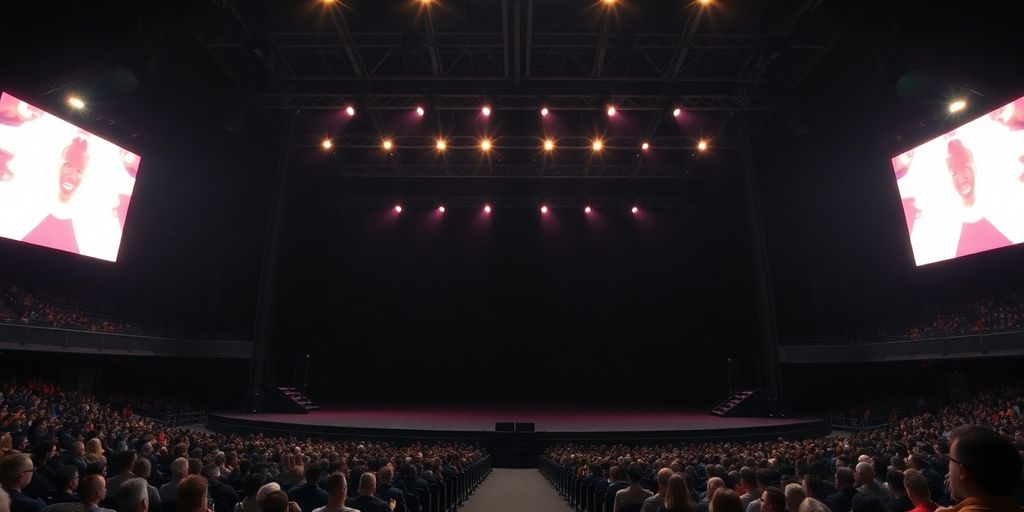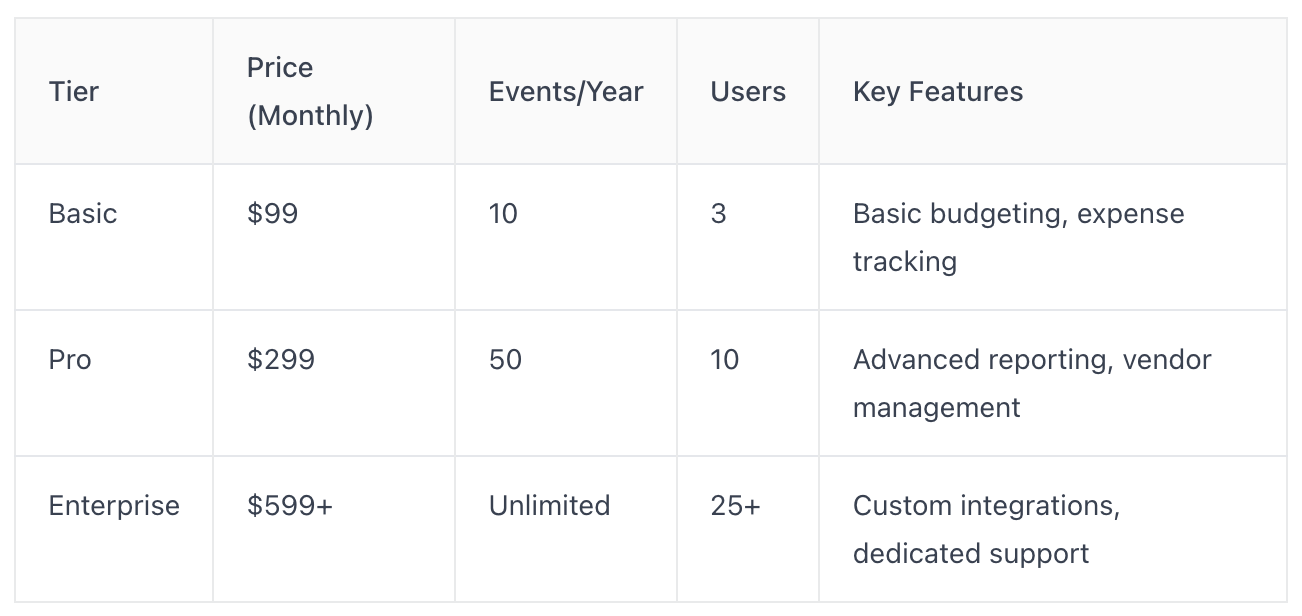Register as an organizer
Click the button below and finish your organizer registration, or fill out the form and we will be in touch to assist you.
.jpeg)
Planning a big concert means you've got a lot of moving parts, and keeping track of all the money involved can get really complicated, really fast. You're dealing with tons of expenses, different income streams, and a need to make smart choices on the fly. That's where good event budgeting software comes in. Picking the right one can make a huge difference, helping you stay on track and avoid financial headaches. This guide will walk you through what to look for when choosing event budgeting software for those large-scale music events.
When planning large-scale concerts, having the right event budgeting software is a game-changer. It's not just about tracking numbers; it's about having tools that can handle the unique financial complexities of such massive events. Let's look at some core features that are essential for success.
Real-time expense tracking is non-negotiable. You need to know where your money is going right now, not next week. This feature allows you to monitor expenses as they occur, helping you stay within budget and make immediate adjustments if needed. For example, if you see that security costs are exceeding projections, you can explore options to optimize staffing or renegotiate contracts. This level of visibility is what separates good budgeting software from great budgeting software. With event management software, you can easily track expenses in line with ticket sales to ensure you’re staying within your planned budget.
Beyond basic expense tracking, integrated financial management tools are vital. This includes features like:
Having these tools integrated into a single platform reduces the risk of errors and saves time. It also provides a holistic view of your event's financial health. This is especially important when dealing with the diverse revenue streams associated with large concerts, such as ticket sales, merchandise, and sponsorships.
Generic reports won't cut it for large-scale concerts. You need customizable reporting and analytics that allow you to drill down into specific areas of interest. This might include:
Customizable reports let you tailor the data to your specific needs, providing actionable insights that can inform future event planning decisions. You can view historical attendance patterns, and leverage insights on marketing, budgeting, and day-of resource allocation.
By analyzing this data, you can make informed decisions about everything from pricing strategies to resource allocation, ultimately maximizing profitability and ensuring the success of your event.
Large-scale concerts present unique challenges when it comes to budgeting. It's not just about having enough money; it's about having a system that can grow with the event, handle unexpected surges, and provide accurate insights at every stage. The right event budgeting software needs to be more than just a spreadsheet – it needs to be a robust, adaptable tool.
One of the biggest scalability tests is how the software handles ticket sales. A system that chokes under pressure during a ticket launch can cause major headaches. You need to ensure the software can process thousands of transactions simultaneously, track different ticket tiers (VIP, general admission, etc.), and integrate with your ticketing platform without a hitch. Real-time seat availability is also a must. Imagine the chaos if you oversell tickets! The software should automatically close registration when an event reaches maximum capacity.
Concerts aren't just about ticket sales. Think about merchandise, food and beverage, sponsorships, and parking. Each of these represents a separate revenue stream that needs to be tracked and managed. The budgeting software needs to be flexible enough to accommodate these diverse sources and provide a consolidated view of overall revenue. It should also allow for easy allocation of funds to different departments or vendors based on these revenue streams. A failure to properly account for these streams can lead to inaccurate financial projections and missed opportunities.
Event planning is rarely a static process. Things change – artists get sick, sponsors pull out, weather throws a wrench in the works. Your budgeting software needs to be adaptable enough to handle these changes. Can you easily adjust budgets on the fly? Can you run "what-if" scenarios to see how different changes will impact your bottom line? Flexibility is key.
A scalable system allows for quick adjustments to budgets, forecasts, and resource allocations as the event evolves. This adaptability is crucial for mitigating risks and maximizing profitability in the face of unforeseen circumstances.

For large-scale concerts, your event budgeting software can't exist in a silo. It needs to play well with other systems you're already using. Think of it as the central hub connecting all your event operations. The ability to integrate smoothly with other platforms is a game-changer for efficiency and accuracy.
Ticketing is the lifeblood of any concert. Your budgeting software must integrate with your ticketing platform. This integration should automatically pull in sales data, track revenue in real-time, and reconcile ticket sales against projected budgets. Without this, you're stuck with manual data entry, which is slow, error-prone, and a waste of time. Look for software that offers direct integrations with popular ticketing systems. This ensures that business planning is accurate and up-to-date.
Understanding your audience is key to a successful concert. Integrating your budgeting software with your marketing and CRM systems allows you to connect marketing spend with ticket sales and audience demographics. This gives you insights into which marketing campaigns are most effective and helps you tailor your budget for future events. You can track the cost per acquisition, identify high-value customer segments, and optimize your marketing efforts for maximum ROI. This also helps with sending automated reminders, and notifications to the right contacts.
Managing vendors and suppliers is a huge part of concert budgeting. Your software should simplify this process by allowing you to track invoices, manage payments, and reconcile expenses in one place. Look for features like automated payment scheduling, vendor portals for submitting invoices, and integration with accounting software. This not only saves time but also reduces the risk of errors and late payments.
Choosing software that integrates well with your existing tools is not just about convenience; it's about creating a connected ecosystem that improves efficiency, reduces errors, and provides valuable insights for better decision-making. It's about making sure everyone is abreast of project schedules and deadlines.
When dealing with large-scale concerts, the software's user experience and the quality of support become extremely important. You don't want your team struggling with a confusing interface when they should be focused on making the event a success. Let's look at what to consider.
The software should be easy to learn and use, even for team members who aren't tech experts. A clean, straightforward interface will save time and reduce errors. Think about it: during a live concert, every minute counts. A complicated system can lead to mistakes in budgeting, payment processing, or even ticket sales. Usability is key. If the team finds the software hard to use, they simply won't use it effectively. This can lead to wasted time, frustration, and ultimately, a less successful event.
Good customer support is a must. When problems arise (and they will), you need to know that help is readily available. Look for software providers that offer multiple support channels, such as:
Having access to quick and reliable support can be the difference between resolving an issue in minutes and dealing with a major crisis during a concert. Make sure the support team is knowledgeable and responsive.
Even with an intuitive interface, proper training is important. The software provider should offer resources to help new users get up to speed quickly. This could include:
Effective training ensures that your team can use all the software's features to their full potential. This leads to better budgeting, more accurate reporting, and ultimately, a more profitable event. A well-trained team is a confident team, and that confidence translates into a smoother, more successful concert experience.
Choosing the right event budgeting software isn't just about features; it's also about understanding how you'll be paying for it. The pricing structure can significantly impact your overall event budget, especially for large-scale concerts where costs can quickly escalate. Let's break down what to look for.
Most event budgeting software comes with tiered subscription plans. These tiers usually differ based on the number of events you can manage, the number of users who can access the system, and the features included. For large concerts, you'll likely need a higher-tier plan to accommodate the scale of your operations. Pay close attention to the limits of each tier; exceeding those limits can result in unexpected overage charges. For example, a basic plan might only allow for a certain number of transactions or reports, which won't cut it for a major concert.
Consider this example:

It's crucial to read the fine print and identify any potential hidden fees. Some common hidden charges include:
Always ask for a complete breakdown of all potential costs before committing to a specific software. Don't be afraid to negotiate, especially if you're a large-scale client.
Ultimately, the value of event budgeting software lies in its ability to streamline financial processes, reduce errors, and provide better insights into your event's profitability. For large events, this value is amplified. A good software can help you:
Consider the return on investment (ROI). While the software might have a significant upfront cost, the time and money it saves in the long run could make it a worthwhile investment. Look for software that offers features specifically designed for large events, such as custom reporting, advanced user permissions, and integration with other event management tools.

Data is king, especially when you're dealing with the complexities of large-scale concerts. It's not just about tracking numbers; it's about understanding what those numbers mean and using them to make smarter choices. The right event budgeting software can transform raw data into actionable insights, helping you optimize everything from ticket pricing to vendor selection.
Gone are the days of relying on gut feelings. Predictive budgeting uses historical data and current trends to forecast future financial performance. This allows you to anticipate potential shortfalls or surpluses, adjust your strategies proactively, and minimize financial risks. For example, if ticket sales for a similar concert last year peaked three weeks before the event, you can plan a targeted marketing push during that same period this year. This is where event budget management becomes invaluable.
It's not enough to just spend money; you need to know if you're getting a return on your investment. Performance metrics, such as cost per attendee, revenue per ticket, and sponsorship ROI, provide a clear picture of what's working and what's not. ROI analysis helps you evaluate the profitability of different event components, allowing you to allocate resources more effectively in the future.
By closely monitoring these metrics, you can make data-driven decisions that maximize profitability and ensure the long-term success of your concert series.
Understanding your audience is crucial for creating successful events. Event budgeting software can collect and analyze data on attendee demographics, preferences, and engagement levels. This information can be used to tailor future events to better meet the needs and expectations of your target audience. For instance, if data shows that a significant portion of your audience is interested in VIP experiences, you can create more premium ticket packages for your next concert. You can also analyze historical attendance patterns to better plan future events.
When dealing with large-scale concerts, the amount of financial data involved is substantial. Think about ticket sales, vendor payments, and sponsorship deals. It's a lot! Protecting this data is not just good practice; it's a necessity. Event budgeting software must have robust security measures in place. This includes encryption, secure servers, and access controls. You don't want any data breaches that could compromise sensitive information.
Different regions have different rules about how financial data is handled. Compliance with these regulations is key to avoiding legal trouble. For example, GDPR in Europe has strict rules about data privacy. PCI DSS standards apply if you're processing credit card payments. Your event budgeting software needs to help you stay compliant with all applicable laws and regulations.
Choosing software that is already compliant with industry standards can save you a lot of headaches down the road. Make sure to check what certifications the software has and what measures it takes to stay up-to-date with changing regulations.
Ticket sales are a huge part of concert revenue, and those transactions need to be secure. The software should integrate with payment gateways that use encryption and fraud detection to protect customers' financial information. You also need to have measures in place to prevent chargebacks and other types of fraud. Secure transactions build trust with your audience and protect your bottom line.
So, when it comes to picking event budgeting software for those huge concerts, it's not just about finding something that looks good. You really need to think about what your event needs. Is it super big? Do you have a lot of different things going on? The right software can make a huge difference, helping you keep track of every dollar and making sure nothing gets missed. It's about making your life easier and your concert a success, without all the money worries. Take your time, look at what each option offers, and pick the one that fits your concert best. It'll pay off, trust me.
Event budgeting software helps you keep track of all the money coming in and going out for your concert. It lets you see your spending in real-time, manages different ways you make money (like ticket sales or sponsorships), and helps you make smart choices about where your money goes.
Absolutely! Good software can handle tons of ticket sales, keep track of money from various sources like merchandise and food, and adjust quickly if your plans change. This means it grows with your event, no matter how big it gets.
It's super important! The best software works smoothly with your ticket selling platforms, marketing tools, and even systems you use to pay vendors. This saves you a lot of time and prevents mistakes because all your information is connected.
Look for software that's easy to use, even if you're not a tech wizard. It should have clear buttons and menus. Also, check if they offer good customer help, like quick answers to your questions, and training materials to help you learn how to use it.
Pricing can be tricky. Some charge a monthly fee, others might take a small cut from each ticket sold. Always ask about all possible costs, and think about what you get for the price. A slightly more expensive option might be worth it if it saves you a lot of headaches and helps you make more money in the long run.
Yes! The software collects data about your spending, income, and even your audience. This helps you guess better for future events, see what worked well, and understand who your audience is. It's like having a crystal ball for your concert finances.
More blogs
Click the button below and finish your organizer registration, or fill out the form and we will be in touch to assist you.